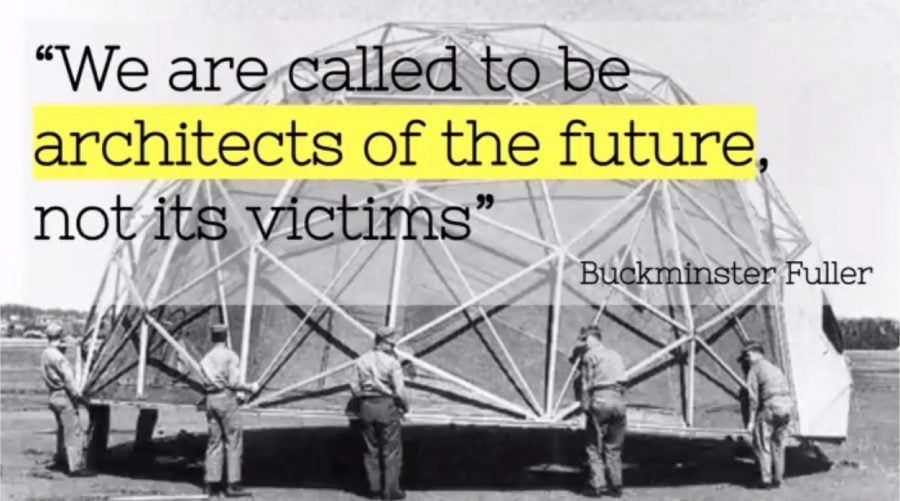
Mary Raber and Brad Turner generously shared their knowledge on Husky Bites, a free, interactive Zoom webinar hosted by Dean Janet Callahan. Here’s the link to watch a recording of her session on YouTube. Get the full scoop, including a listing of all the (60+) sessions at mtu.edu/huskybites.
What are you doing for supper this Monday night 11/2 at 6? Grab a bite with Dean Janet Callahan and Mary Raber, Chief Doing Officer of IDEAhub, Michigan Tech’s collaborative working group for educational innovation. Joining in will be Brad Turner, one of Mary’s former students, who earned his BS in Software Engineering 2017. He started his career at Handshake SF and recently joined Blackfynn Philly.
In this Husky “bite” you will be introduced to how Michigan Tech is using design thinking to reimagine education for the 21st century, and how Brad has used the process in his work after graduation.
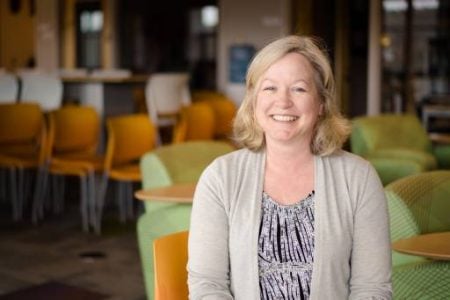
A professor of practice, Raber serves as assistant dean for academic programs in Michigan Tech’s Pavlis Honors College. She’s also co-director of Husky Innovate (Michigan Tech’s resource hub for innovation & entrepreneurship). A design-thinking and innovation enthusiast, Raber loves to help others embrace the tools and mindsets of innovation to effect positive change.
While earning his software engineering degree at Michigan Tech, Brad Turner joined the Pavlis Honors College. He worked as student coordinator for the Innovation Program within the PHC Innovation Center for Entrepreneurship, and that’s when he met Raber. “Mary became my mentor,” he said.
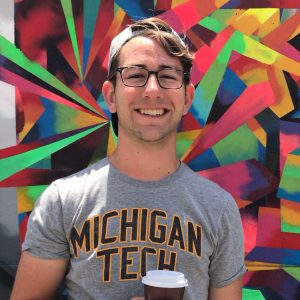
Nowadays, Turner is a product designer, one who recently made the switch from building tools that help college students find jobs, to designing software that improves the treatment of neurological diseases.
During Husky Bites, Raber and Turner will introduce the design thinking process, developed at the Stanford d.school.
“Design thinking is a tool to help you reframe life’s challenges into opportunities,” says Raber. “It’s a process widely used to solve messy, wicked problems,” she explains. “At its core is the human…those whose lives we are trying to improve in some way. The process fosters mindsets and skills that enables anyone, young and old, to tackle ambiguous problems.”
After a 14-year career in the automotive industry, Raber first joined Michigan Tech to lead the implementation and growth of the highly distinctive undergraduate Enterprise Program. She helped found the Pavlis Honors College, where she now facilitates learning in leadership, human-centered design, and lean start-up.
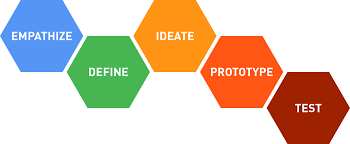
Raber was honored with Michigan Tech’s Faculty Distinguished Service Award in 2018. “Through Mary’s exceptional dedication and efforts, opportunities and resources for innovation and entrepreneurship on our campus have grown substantially,” said Lorelle Meadows, dean of the Pavlis Honors College.
Over the years Raber has co-founded several start-ups (“some of which have been successful, and some that haven’t fared as well,” she says). She’s currently pursuing a PhD at Michigan Tech with a focus on engineering education, and working on developing another start-up to help bring her passion for innovative teaching and learning to others.
“Design thinking is a tool to help you reframe life’s challenges into opportunities.”
Raber has cultivated a strong relationship with the Stanford d.school, opening up additional avenues for student exploration and education. Through this collaboration, Michigan Tech has a highly active group of University Innovation Fellows (UIF).
“Fellows work to ensure that their peers gain the knowledge, skills and attitudes required to make a positive impact on the world,” Raber explains. “They attend training at Stanford’s d.school, where they can meet students from across the country engaged in change-making on their own campuses.” Michigan Tech’s UIFs engage with incoming first-year students during orientation week, exposing them early on to powerful entrepreneurial tools and resources.
Turner was a University Innovation Fellow during his years at Michigan Tech. He worked closely with Raber to develop and launch Michigan Tech’s first-ever makerspace, The Alley, located on campus in the Memorial Union Building. He facilitated design thinking classes, and developed a visual language for Alley.
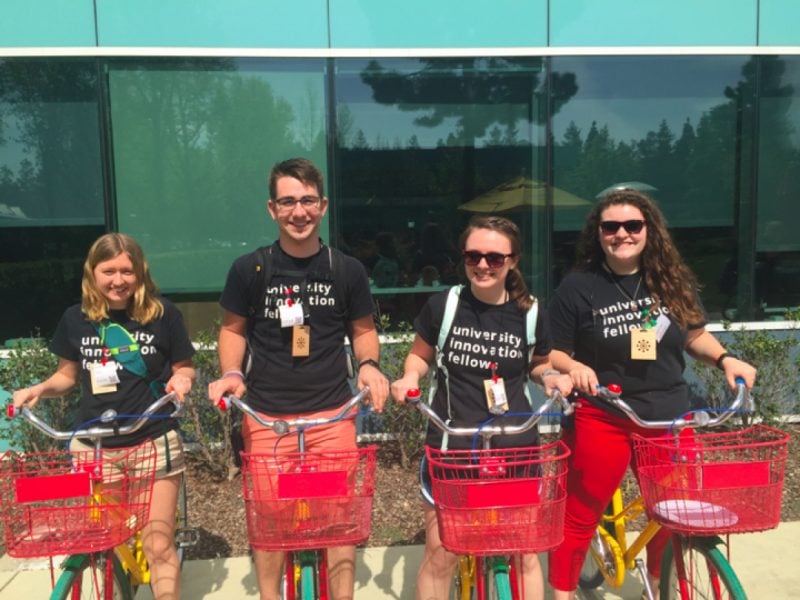
“I went through the (UIF) training with the Stanford d.school during my second year at Tech,” Turner recalls. “It was an 8-week online course where we learned about design thinking. “When I started working on more initiatives related to UIF, I found myself continually looking to Mary for advice, guidance, and support on those initiatives. By the time I graduated, Mary and I worked on a variety of projects together and presented our work together on campus and at national conferences.”
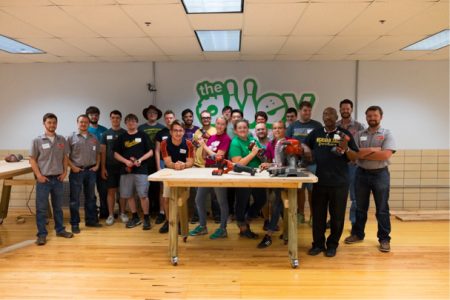
In 2014 Turner took an internship at Handshake, a company founded 2014 by three engineering students at Michigan Tech to give students access to a larger number of potential employers, no matter their location. Turner worked in the company’s first small office in Houghton, then moved with them to San Francisco for a second internship. Upon graduation he joined the company, helping grow its design system and processes as the Handshake team grew from 35 to over 200 employees.
As Handshake’s lead designer on a variety of projects, Turner collaborated with project managers to dig into challenges and articulate compelling problem statements. He conducted user research and user testing, and partnered with engineers to deliver high quality, accessible experiences.
Turner recently moved from Handshake to Blackfynn, a company that seeks to transform the treatment of neurological disease—including Parkinson’s disease, which affects nearly one million people in the US—with data-driven, next-generation therapeutics.

Mary, when did you first get into engineering? What sparked your interest?
I enjoyed math, science and design in high school, so engineering seemed like a logical next step. My concentration was in biomechanics and I was hooked on the connections between health and engineering with my first internship at UMich hospitals where I tested hypodermic needles on cadavers. I was very fortunate to get my first job after graduation at Chrysler Motors working with an all female engineering team to design the sensing and diagnostics systems for the first mass-produced airbag systems. It’s led me to fascinating careers in automotive electronics and now engineering education.
Hometown, Hobbies, Family?
I have lived in Michigan all my life, moving back and forth from lower Michigan to the UP several times. I’m easing into the empty nester life while my son lives nearby and attends Michigan Tech, and occasionally brings his laundry home. I love to travel and have had the opportunity to visit many wonderful places around the world. In my spare time I enjoy hiking, gardening, skiing, and creating through hobbies like baking, knitting, and quilting.
Brad, How did you first get into engineering? What sparked your interest?
After watching too much Grey’s Anatomy in high school, I was sure that I wanted to be a surgeon when I grew up. I was also interested in technology, so instead of thinking about going to med school, I decided to study biomedical engineering to blend my interests in medicine and technology. (My interest in biomed only lasted a year before I discovered design thinking and decided to switch to software engineering).
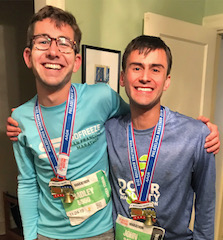
Hometown, Hobbies, Family?
I grew up in Bay City, Michigan. My older brother was studying mechanical engineering at Michigan Tech and I really enjoyed Houghton when I came to visit him. After spending a weekend on campus with the Leading Scholars program during my senior year of high school, I knew it was the right place for me. I’ve spent the past 4 years in San Francisco and recently (during the pandemic) found a new home with my partner in Philadelphia. Outside of work you’ll normally find me running along the Schuylkill River, trying out a new recipe in my kitchen, or virtually volunteering to help get out the vote this November.